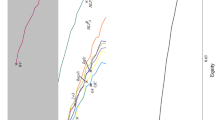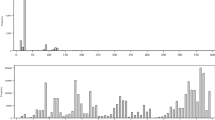Abstract
I show that, contrary to Duverger’s law, three or four parties receive at least 5 per cent of the votes in most districts in British and Canadian elections. This is so because the voters and the parties are not necessarily short-term utility maximizers as the theory assumes. Still, the basic intuition that fewer parties obtain significant support under single-member district plurality elections is absolutely correct. Duverger also makes an important contribution instressing the impact of electoral formulas, a fruitful antidote to the exclusive emphasis that recent research has given to district magnitude.
Similar content being viewed by others
Notes
Note, however, that strictly speaking the vote distribution should be computed at the district level. But Table 1 shows that things are not that different at the district level.
Very similar findings are reported by Katz (1997, p. 147).
These two studies suggest that electoral laws interact with the socio-economic structure (measured by ethnic fragmentation), that is, the impact of ethnic fragmentation emerges only under a permissive electoral system. In fact, a close reading of Table 2 in Clark and Golder (2006) shows no significant interaction effect between ethnic fragmentation and district magnitude.
References
Blais, A. (2002) Why is there so little strategic voting in Canadian plurality rule elections? Political Studies 50 (2): 445–454.
Blais, A. (2013) Evaluating U.S. electoral institutions in comparative perspective. In: J.H. Nagel and R.S. Smith (eds.) Representation: Elections and Beyond. Oxford: Oxford University Press.
Blais, A. and Carty, R.K. (1991) The psychological impact of electoral laws: Measuring Duverger’s elusive factor. British Journal of Political Science 21 (1): 79–93.
Blais, A. and Loewen, P. (2009) The electoral system and its effects. West European Politics 34 (2): 342–356.
Clark, W. and Golder, M. (2006) Rehabilitating Duverger’s law: Testing the mechanical and strategic modifying effects of electoral laws. Comparative Political Studies 39: 679–708.
Cox, G.W. (1997) Making Votes Count. Strategic Coordination in the World’s Electoral Systems. Cambridge, UK: Cambridge University Press.
Duverger, M. (1951) Les partis politiques. Paris, France: Colin.
Duverger, M. (1954) Political Parties. New York: Wiley.
Gunther, R. (1989) Electoral laws, party sysrtems, and elites: The case of Spain. American Political Science Review 83 (3): 835–858.
Katz, R.S. (1997) Democracy and Elections. Oxford: Oxford University Press.
Lago, I. and Montero, J. R. (2009) Coordination among arenas in multi-level countries. European Journal of Political Research 48 (2): 176–203.
Taagepera, R. and Shugart, M.S. (1989) Seats and Votes. New Haven, CT: Yale University Press.
Acknowledgements
The author would like to thank Jean-François Daoust for excellent research assistance.
Author information
Authors and Affiliations
Rights and permissions
About this article
Cite this article
Blais, A. Is Duverger’s law valid?. Fr Polit 14, 126–130 (2016). https://doi.org/10.1057/fp.2015.24
Published:
Issue Date:
DOI: https://doi.org/10.1057/fp.2015.24




